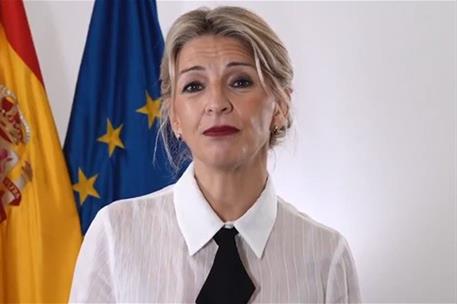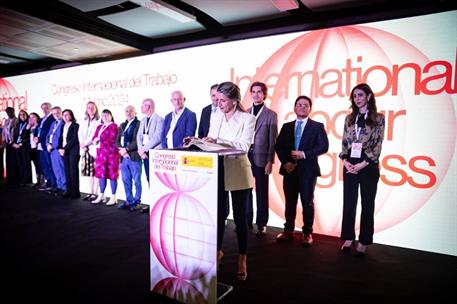In the Employment, Social Policy, Health and Consumer Affairs Council (EPSCO)
Yolanda Díaz stops Hungarian proposal for the future directive on trainees in the Employment Council
News - 2024.12.2
The Vice-President and Minister for Work and Social Economy, Yolanda Díaz, at the Employment, Social Policy, Health and Consumer Affairs Council (EPSCO) held in Brussels
The Vice-President and Minister for Work and Social Economy, Yolanda Díaz, has mobilised her counterparts in the European Union (EU) to stop the proposal presented by the Hungarian rotating presidency on the future directive that will regulate traineeships throughout the European Union at the Employment, Social Policy, Health and Consumer Affairs Council (EPSCO), which is being held in Brussels.
Traineeship Directive
At the first EPSCO Council with the new European Commission, Diaz said that the general thrust of the directive does not meet European legislative standards. "How can we allow our young people to be used as cheap labour by hiding it under the label of "training?" the vice-president objected on her arrival at the Europa Building in Brussels, where the Council is being held.
"We have managed to convince other partners and block a draft that would mean precariousness for a whole generation. This is our clear message: we will not compromise on the labour rights of young people," she said, after winning the support of Germany, Romania, Belgium, Portugal, Austria, Bulgaria, Slovenia and Cyprus to prevent the Hungarian proposal from going through.
The Hungarian presidency's proposal restricts the scope of application by excluding traineeships that are part of formal education and vocational training curricula or those carried out in the framework of active employment policies, among others.
Furthermore, it opens the door to discrimination against trainees by establishing grounds for the different treatment of trainees, makes it more difficult to fight against bogus traineeships or circumvents the usual references to the acquis communautaire that guarantee the full application of labour law, among others.
"Spain cannot support legislation that does not advance labour rights. And we will not do so until we have a text that truly protects working people, in direct application of the Social Pillar," the minister told her counterparts at EPSCO.
The vice-president defended a directive that would provide trainees with employment rights and give importance to training during traineeships. "It is essential to prevent traineeships from being used to replace employees in the company," said the vice-president, who recalled that in Spain, for example, measures have already been taken in this respect.
Spanish legislation guarantees the rights of trainees and clearly distinguishes between training activities and productive and work-related activities. "With our labour reform, we protect people with training contracts. Now we are going further: we will take to a bill to the Lower House that will guarantee the rights of trainees, putting an end to their exploitation, after reaching an agreement with our country's trade unions," she explained.
Future priorities in employment and social policies
In the debate on future priorities in employment and social policies, also addressed by EPSCO, the vice-president defended the need to place Social Europe at the heart of the European project by adopting specific measures and appropriate legislation with the aim of ensuring decent living and working conditions and making progress towards a fair digital and ecological transition.
According to the vice-president, the policies of the new Europe must focus not only on the economy, and in this sense, she points out that measuring economic success without paying attention to inequalities could have catastrophic consequences for the European project. "That is why we will continue to work to broaden and codify the principles of the European Pillar on Social Rights," she said.
Bilateral meeting with the new Commissioner for Employment, Roxana Mînzatu
On the fringes of the EPSCO Council, Vice-President Díaz is met with the new Vice-President of the European Commission and Commissioner for Skills, Education, Quality Jobs and Social Rights, the Romanian Roxana Mînzatu, with whom she will discuss the traineeships directive and the legislative priorities facing the future European legislature, such as the regulation of workers' rights in relation to the use of artificial intelligence at work or the right to training at work, among other issues.
Non official translation






